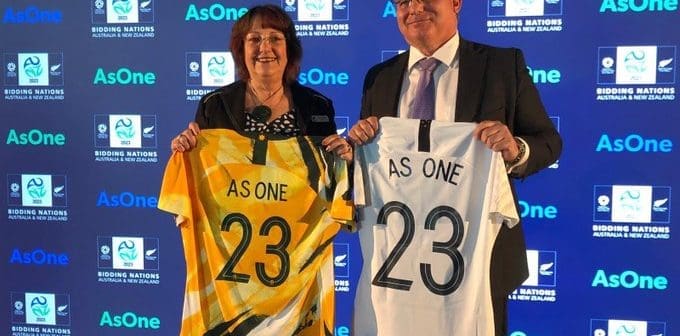The race to host the 2023 FIFA Women’s World Cup intensified this week as interested nations submitted their Bid Books to FIFA ahead of Friday’s deadline.
South Africa’s desire to bring a first Women’s World Cup to the African continent ended when they confirmed they would not be progressing with their bid. Meanwhile, the chances of a World Cup Down Under were strengthened as two separate bidding nations, Australia (AFC) and New Zealand (Oceania), joined forces to submit the first-ever co-confederation attempt to host a major football tournament.
With the unified backing of both countries’ governments, the two Antipodean countries, who also combined to host the 1987 Rugby World Cup, “promises to amplify women’s football in Asia and Oceania like never before as the two culturally and geographically aligned nations work ‘As One’ to deliver a truly inspired celebration of women’s football”. Both nations had initially vowed to bid alone but now view a collaboration as “a logical and compelling response to the expanded 32-nation format that will be introduced in 2023″.
Australian Federal Minister for Youth and Sport, Richard Colbeck said, “our bid for the FIFA Women’s World Cup 2023 strongly aligns with the Australian Government’s commitment to inspire more girls and women to participate in sport and increase their physical activity for better health and well-being,”
New Zealand Minister for Sport and Recreation, Grant Robertson added, “New Zealand and Australia are both countries that champion and celebrate women’s sport, and it has been no surprise to see the football community, stadia, host cities and states across our two countries embrace this bid”.

FFA Chairman Chris Nikou and New Zealand Football President Johanna Wood at the launch of the #AsOne 2023 Women’s World Cup bid (Picture: www.asone2023.com)
New Chelsea signing, Australia’s Sam Kerr admitted that “hosting the FIFA Women’s World Cup in Australia would be a dream come true for me. There is so much untapped potential, not just in Australia but right across Asia and the Pacific region. I really do believe we would offer something incredibly special to FIFA”. New Zealand striker Rosie White currently playing for Reign FC added, “if New Zealand and Australia were to host a World Cup it would change football in our region forever”.
As part of their bid, the two countries are promising to stage the tournament across 13 stadiums in 12 cities and attract a record attendance of 1.5 million over the 64 matches. The final would be played at the 75,000-capacity ANZ Stadium in Sydney. Last summer’s tournament in France drew 1,131 million fans to watch 52 matches.
Considering the remoteness of the two countries in relation to the rest of the world, they are also committing to “scheduling kick off times to maximise broadcast exposure” and “a commitment to equitable team travel” across the two countries.
In contrast, Japan, who will host the 2020 Olympic football tournament across seven venues in six cities are offering a smaller-scale World Cup using eight stadiums – Kobe, Kyoto, Saitama, Sapporo, Sendai, Suita, Tokyo and the Toyota Stadium – 32 training bases and 42 referee camps. “FIFA requested a tournament with eight venues, and adding one more would increase costs significantly”, admitted JFA President Kozo Tashima. “We’re a small country and can take advantage of our transit system, including the bullet train and air routes. With eight stadiums we can run a smooth tournament and keep our costs down”.
“Between next year’s Olympics, the professionalisation of the women’s league from 2021 and this Women’s World Cup, we want to give a significant boost to women’s soccer and that is why this bid is so important.”

Japan Football Association President, Kozo Tashima (Picture: www.japan2023bid.com)
“With Japan’s proven ability to host international tournaments and our spirit of omotenashi (hospitality), we want to put on a Women’s World Cup that will bring joy not only to participating nations but to us as hosts.”
Japan are also proposing that the tournament start earlier than the dates reserved for the tournament in the FIFA Women’s International Match calendar between 10 July and 23 August 2023. As Tashima explained, “it’s not good to ask players to rest for two months and then play a World Cup in July. With most of the world’s top players in European leagues, we think that holding the tournament in June will help players stay in peak condition.”
Earlier this week, South Africa pulled out of the race having been one of the first to declare an interest even before their national team Banyana Banyana qualified for it’s first World Cup last year. “We resolved that as an association we should not proceed with the bid”, said SAFA’s acting Chief Executive Officer Hay Mokoena.
“We want to strengthen our women’s national league first before we invite the world to come and play. Definitely, we will consider doing 2027 and we think by that time, we will have a stronger women’s league and a much stronger women’s national team”.
South Korea have also withdrawn their bid to host the tournament due to concerns that they may violate their own national law by complying with new FIFA rules for the World Cup Local Organising Committee. “In addition, FIFA raised the bar for overall facility requirements to the same level as the men’s World Cup . Given the uncertain economic effects of the event, it was difficult for local governments to accept FIFA‘s requests for enhanced facility standards and subsequent guarantees”.
The 32 board members of the FIFA Council will vote in June 2020 on who will host the ninth FIFA Women’s World Cup. Brazil, and Colombia are also bidding to stage the first 32-team tournament.
![Prost International [PINT]](https://prostinternational.com/wp-content/uploads/2021/08/PINTtFontLogoRoboto1536x78.jpg)



